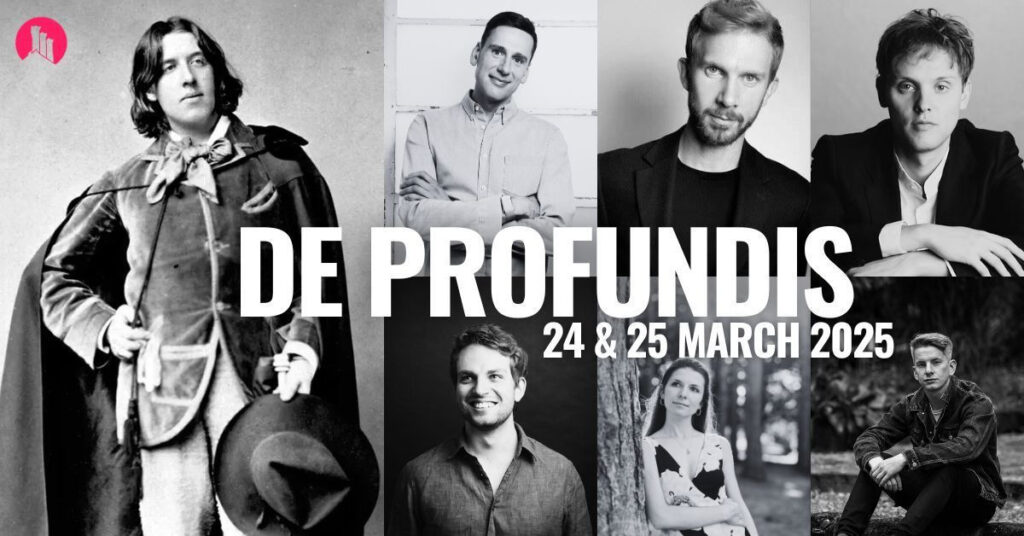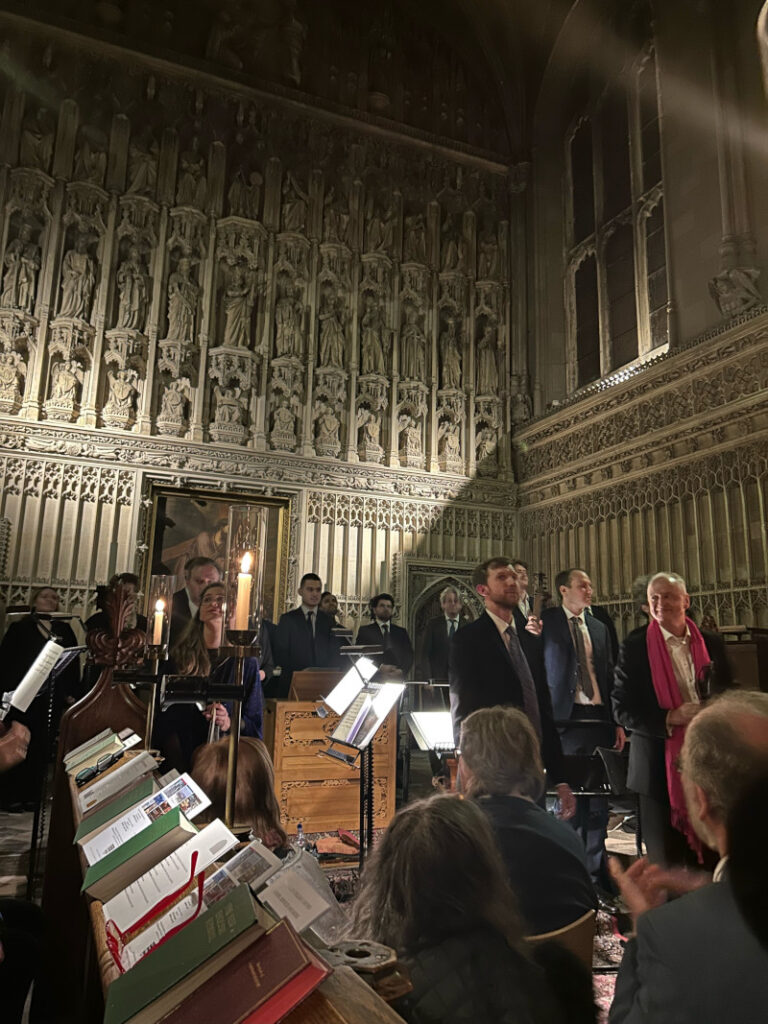As part of the Music in Oxford series, the award-winning music ensemble Vache Baroque produced an artfully conceived programme built around Oscar Wilde’s De Profundis letter of 1897, written during his incarceration in Reading Gaol for ‘gross indecency’. Entitled ‘Out of the Deep’, this Lenten meditation, arguably a passion story, given in the Chapel of Magdalen College, interleaved extracts from Wilde’s highly personal monologue read by Malcolm Sinclair with musical offerings largely drawn from Henry Purcell, J.S. Bach and the Bohemian composer Jan Dismas Zelenka, variously performed by the 20 or so musicians of Vache Baroque under the direction of Jonathan Darbourne.
Given the sheer volume of material available for such a cross-cultural enterprise, it was impressive to hear so many well-matched musical selections that paralleled the emotional journey of this pleasure-seeking aesthete (and alumnus of Magdalen College) following his disastrous libel suit against the Marquess of Queensberry. His disgrace, persecution and subsequent ‘Road to Calvary’ was to find spiritual release in a transformative reconciliation with Christ. And the final reading of Wilde’s children’s tale, The Selfish Giant, aptly mirrored the writer’s late conversion to Christianity when, on his deathbed in 1900, he wished to be baptized and received into the Church.

Early in the programme, Wilde’s recollections recalling an encounter with his former lover Lord Alfred Douglas was followed by Purcell’s ‘Sweeter than Roses’ where Alexander Chance (countertenor) vividly conveyed the poet’s exquisite sensations following the frisson of a first kiss. And with the explicit implication from De Profundis that Wilde ‘drew careless of the lives of others’, we segued into Purcell’s ‘Jehovah quam multi sunt hostes mei’, where the psalmist’s petitions and the composer’s expressive harmonies were beautifully underlined by the vocal ensemble (if with just a little indulgence), and three solo voices. Wilde’s despair during his two-years’ hard labour, was caught to perfection in the sympathetic correspondence heard within Purcell’s ‘In the black dismal dungeon of despair’, its tormented pleas powerfully expressed by Guy Cutting.

Apart from a madrigal by John Wilbye extolling the virtues of pleasure (chiming nicely with one of Wilde’s quips ‘I can resist everything except temptation’), and a lively Galliard composed by Peter Philips whilst in a Dutch prison, the remainder of the evening’s first half was occupied by Zelenka’s seldom performed 1724 De Profundis. With numerous Latin settings of Psalm 130 by French composers (Charpentier, Lalande, Lully, Mondonville et al), the Zelenka was an inspired decision, its sombre appeals for clemency here initiated by three warm-toned basses with eloquent support from oboes and strings. Subsequent verses were equally polished with choral passages set off by gratifying exchanges between Oonagh Lee’s oboe and Cutting’s cleanly articulated tenor.
Wilde’s bitterness at society’s failings and his condemnation of the Victorian prison system was coupled with the consoling strains of J. S. Bach’s Aus der Tiefen rufen ich, Herr, zu dir, its sure-footed direction coaxing a detailed and involving account much indebted to careful blending and lovingly shaped phrases. Associations with Bach framed this early cantata with Hassler’s harmonisation of the Passion chorale ‘Mein G’müt ist mir verwirret’ (‘O sacred head, sore wounded’) and an arrangement of Brahms’s organ prelude ‘Herzlich tut mich verlangen’, its heartbreak shared by unison men’s voices and divisi strings to sublime effect.
No less absorbing were two movements from the Requiem Mass, De Profundis of French composer André Campra, performed as a poignant reminder of Wilde’s death, aged just 46, in a shabby hotel room in Paris. Any thoughts of his poverty were swept aside in the solemnity of Campra’s music, those glorious suspensions bringing catharsis to all restless souls.
Vache Baroque has, once again, shown itself to be a class act and its flair for cultural synthesis and musical excellence makes this one of the UK’s hottest groups.
David Truslove
Programme:
Peter Phillips – Galliard ‘Dolorosa’; John Wilbye – Ye that do live in pleasures plenty;
Henry Purcell – Sweeter than roses, Jehovah quam multi sunt hostes mei, In the black dismal dungeon of despair; Jan Dismas Zelenka – De Profundis, ZWV 97; Hans Leo Hassler – Mein G’müt ist mir verwirret; J. S. Bach – Aus der Tiefen rufen ich, Herr, zu dir, BWV 131; Johannes Brahms – Herzlich tut mich Verlangen; André Campra – De Profundis, Requiem
Betty Makharinsky – soprano; Alexander Chance – countertenor; Guy Cutting – tenor, Malachy Frame – baritone; Jonathan Howard – bass; with 2025 James Bowman Young Artists: Jessica Hopkins, Mariana Rodrigues, Laura Toomey, Bradyn Debysingh, Alexander Semple, Will Harmer; The Vache Baroque Band: Sophia Prodanova – violin; Charlotte Fairbairn – violin/viola; Kate Fawcett – viola; Jacob Garside – cello/viola da gamba; Carina Cosgrave – bass; Oonagh Lee – oboe/recorder; Joel Raymond – oboe/recorder; Toby Carr – Theorbo; Makoto James – organ; Jonathan Darbourne – director; Malcolm Sinclair – reader
Top image courtesy of Music at Oxford.